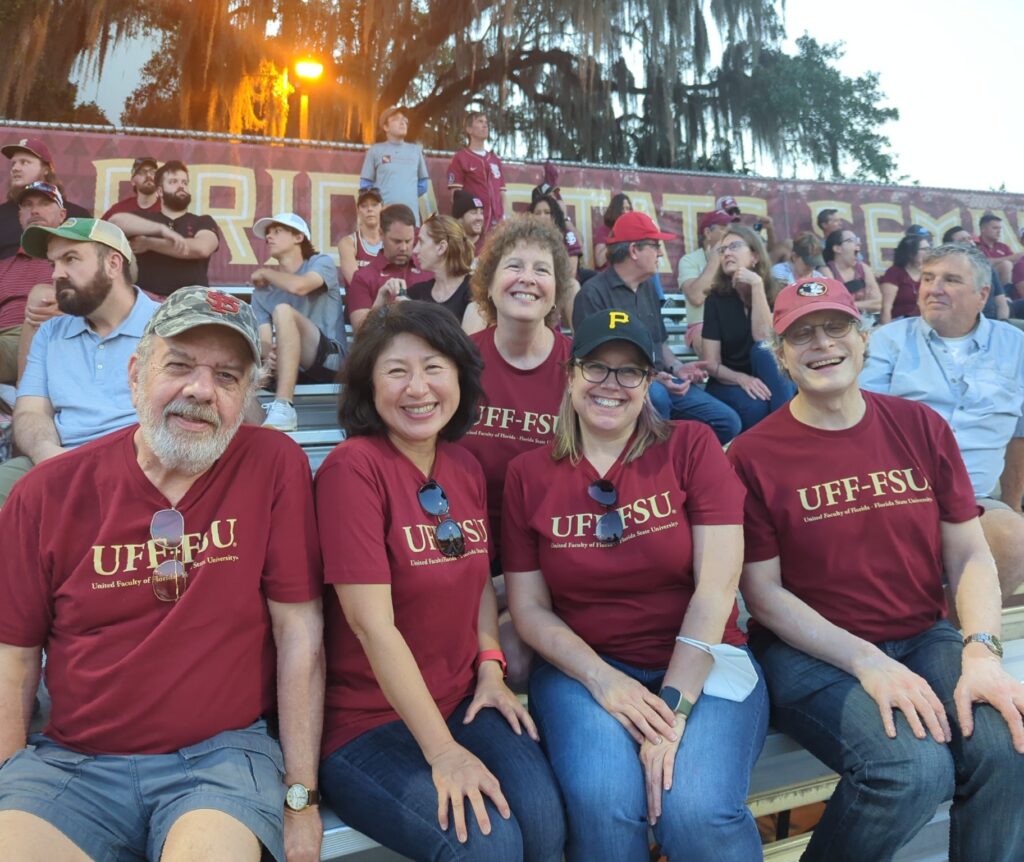The bargaining teams met Wednesday and made great progress on one article, discussed an appendix that still needs a bit of work, heard the first Salaries proposal, and tentatively agreed to another article.
In what the UFF team considers great news, the teams are close to agreement regarding Article 18 (Inventions and Works). The BOT’s proposal changes the term “Appreciable University Support” to “Appreciable University Resources,” which has the crucial effect of removing the possibility that salary could fall in the category. It also drops the notion that independent efforts need to fall outside a faculty member’s institutional expertise in order for the University to not claim a financial interest, which is a major gain over existing language.
Despite having resolved differences on this article, the BOT wants to postpone a tentative agreement until after the teams have carefully reviewed the latest BOT proposal and considered related provisions such as Article 19 (Conflict of Interest/Outside Activity). We look forward to seeing their next Article 19 proposal and continuing the conversation.
There is still a bit of disagreement about Appendix K, particularly the notion that faculty must disclose as a Reportable Activity the financial interest of a relative who has at least a $5,000 interest in a publicly-traded company related to the faculty member’s institutional expertise. If you’re a chemist, do you know if your nieces and nephews have stock in Pfizer? You’d better! We plan on presenting a counter-proposal at our next session.
The UFF presented a proposal for Article 23 (Salaries) that specifies the following:
- Performance Increases of 8.3% to all faculty employed since fall 2021 who achieved at least “meets FSU’s high expectations” in their recent evaluation
- Departmental merit (with the same eligibility as above) of 2.5% of the faculty salary base
- Zero “Deans’ merit”
- Market Equity increases of 2% of the faculty salary base (with a cap of $5,000 for tenured or tenure-track faculty and $2,500 for specialized faculty)
- Administrative Discretionary Increase pool amount of 0.5% of the faculty salary base
- Promotion increases continued at the current rates of 12% for promotion to the second rank and 15% to the highest rank
- Sustained Performance Increases of 3% at the seventh year in the top rank and every seven years thereafter (as long as they consistently have “met FSU’s high expectations”)
The session concluded with signing a tentative agreement on Article 29 (Amendment and Duration), which specifies that negotiations for the next 3-year contract begin in the spring of 2025 and that negotiations for the two intermediate contracts begin on April 1 of each year.
The next bargaining session is scheduled for Wed., June 1, from 2:00-5:00. Bargaining sessions are open to faculty, and we appreciate having you! Meetings are face-to-face at the FSU Training Center (493 Stadium Drive). We are pleased that faculty are showing up in person and via Zoom. If you would like to attend remotely, please respond to this message and we’ll send you the Zoom link. (Alternatively, if you retained a previous bargaining Zoom link, it will still work.)
Regular bargaining updates can be found at our webpage: https://uff-fsu.org/
The key to a strong Collective Bargaining Agreement is a strong membership base, so if you are not a member, please join! There has never been a more important time for us to stand together. https://uff-fsu.org/wp/join/
All best,
Irene Padavic and Scott Hannahs



